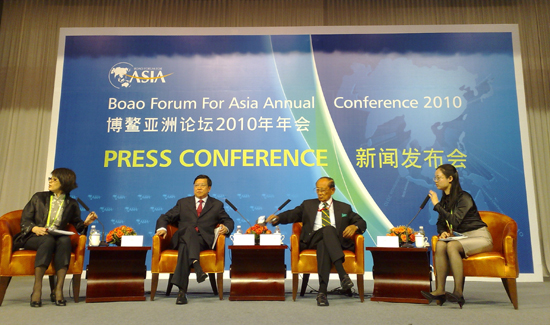Boao forum opens annual session, focusing on Asia's 'green' recovery
The Boao Forum for Asia (BFA) Annual Conference 2010 officially opened Saturday in Boao in south China's Hainan Province, with a focus on Asia's sustainable recovery from the economic downturn.
"Green recovery" is the most important key word for BFA 2010, said Long Yongtu, the forum's secretary general on Friday.
 |
|
Boao Forum for Asia 2010 highlights 'green' recovery. |
The 2010 Boao Forum for Asia in Boao, Hainan Province, is themed "Green Recovery: Asia's Realistic Choice for Sustainable Growth."
China has been working "actively and seriously" to tackle climate change and build capacity to respond to it, Chinese Vice President Xi Jinping told the opening ceremony. "We have joined global actions to tackle climate change with the utmost resolve and a most active attitude, and have acted in line with the United Nations' principle of common but differentiated responsibilities," he said in a key-note speech.
He said China's move to speed up transformation of economic growth pattern and adjustment of economic structure is a positive contribution to Asia's and the global fight against climate change.
Xi also called on Asian nations to further open market, firmly oppose all forms of protectionism and "uphold a fair, free and open global trade and investment system."
The fast economic growth of China and other countries in Asia has attracted worldwide attention, especially after the economic recession, but we need to rethink our development strategy from a global perspective to achieve sustainable growth, Long said.
The biggest challenge is to ensure quality, efficient and green growth rather than to have only strong economic data, Long said at the opening ceremony.
Asia's development has brought not only an economic miracle but also excessive consumption of energy and resources and increased carbon emissions, worsening the climate and environment, Long said. We need to import expertise in low-carbon technology from developed countries and transform our own economic structure, he said.
Meanwhile, Asia should enhance cooperation with other regions to increase its say in formulating the world's low-carbon economic market rules and standards, he said.
Fidel V. Ramos, chairman of the forum's Board of Directors and former president of the Philippines, said that Asian countries should integrate green economic growth through government-encouraged investment and that countries should make clear they are ready for a green economy.
"Green recovery will cost a lot for those developing countries that lack low-carbon technology and still face challenges in employment and poverty relief," Ramos said.
As "green recovery" aims for sustainable development, increasing jobs and improving people's living standards, it shouldn't create a burden for countries that are not ready for green recovery, Ramos said.
For Mongolia, one of the major challenges is to transform an economy with substantial national resources into a green one, said Mongolian Prime Minister Sukhbaataryn Batbold.
Batbold said Mongolia will increase green investment in mining, railway and building sectors and use more environment-friendly technologies.
But he said the country is facing a dilemma of development as Mongolia needs decades to get rid of dependence on fossil fuels.
An additional investment of more than 10 trillion U.S. dollars is predicted to be used globally by 2030 to combat climate change, which means each country must invest one percent of its gross domestic product in this regard, Danish Prime Minister Lars Loekke Rasmussen told the opening ceremony.
Afghan Second Vice President Mohammad Karim Khalili emphasized the importance of regional cooperation in achieving green growth. He said Asian people, socially and culturally linked to each other, should jointly work to address common challenges.
Besides global warming, Khalili said a secure and politically-stable environment is key to economic development. He called for enhanced cooperation on cracking down on terrorism, narcotics and organized crimes.
This year's forum has gathered nearly 2,000 delegates of high-level state leaders, business elites and academicians from Asia and other parts of the world.
The BFA, established in 2001, is a pan-Asian platform of dialogue for key issues affecting Asia and the world. The theme of this year's meeting is "Green Recovery: Asia's Realistic Choice for Sustainable Growth."
 0
0 







Go to Forum >>0 Comments